Retro Replay Review
Gameplay
Cuthbert in the Mines offers a deceptively simple premise that quickly reveals a steep learning curve. You control Cuthbert as he climbs through a layered mine shaft filled with speeding ore wagons, timing each step to avoid being smashed or sent tumbling back down. The action is continuous and requires keen reflexes as you dodge hazards on multiple levels of rails while plotting your ascent to freedom.
The game’s structure is reminiscent of Frogger, but turned on its head: instead of crossing a road, you’re ascending rails, and instead of cars, you contend with ore wagons that careen past with little warning. Adding to the tension is a ladder visited by Satan himself, who sporadically appears to hurl firebolts at Cuthbert. A direct hit from the flames sends you plummeting into the fiery pits below, ending the current life immediately.
Lives are represented by a queue of Cuthberts waiting their turn; you have a total of five before it’s game over. Hits from wagons don’t kill you outright but knock you down to a lower level, making you retrace your steps while the pace of the mine’s hazards remains unrelenting. Survive the climb, and you’ll see the surface—only to have the challenge ramped up further with faster wagons and narrower gaps between them.
The balance between risk and reward is finely tuned. Moving too quickly guarantees a collision, but dawdling invites Satan’s wrath. Each run feels like a carefully choreographed dance, with timing windows that grow tighter the higher you climb. For players who thrive on pattern recognition and split-second decisions, Cuthbert in the Mines delivers an addictive gameplay loop.
Graphics
Visually, Cuthbert in the Mines embraces an early 8-bit aesthetic that immediately transports you to the golden age of home computing. The sprite work is simple yet expressive: Cuthbert’s tiny form leaps and recoils convincingly, while the ore wagons clatter past with satisfying consistency. There’s a charming clarity to the visuals that ensures you always know exactly when and where to move.
The color palette leans heavily on dark browns and blacks for the mine walls, punctuated by bright oranges and reds in the flaming pits below. This contrast not only adds atmosphere but also serves a gameplay purpose, instantly alerting you to deadly zones. Satan’s sprite, complete with a neon-red pitchfork and menacing grin, stands out sharply against the backdrop, making his attacks unmistakable.
Animation frames are limited but put to good use. The ore wagons follow predictable paths, yet the slight pixel jitter as they thunder by gives a sense of weight and momentum. Cuthbert’s animated climb—arms flailing as he scrambles up the ladder—adds a layer of urgency to every attempt. Even accidental stumbles have their own little animation flourish, contributing to the game’s overall personality.
Despite its age, the game’s presentation holds up thanks to its clear visual hierarchy and consistent style. Background details are kept to a minimum, focusing your attention on the immediate threats. The result is a game that feels both nostalgic and timeless, proving that clever design can outweigh flashy graphics.
Story
At its core, Cuthbert in the Mines tells a straightforward tale: our plucky hero is trapped in a nightmarish mine that blurs the line between industrial catastrophe and the underworld. The opening premise sets the tone with minimal exposition—Cuthbert must climb, avoid hazards, and escape—yet the atmosphere does the heavy lifting, evoking a sense of danger and dark whimsy.
The queue of Cuthberts waiting their turn introduces a tongue-in-cheek notion of expendable lives: each fallen Cuthbert is immediately replaced, as if the game’s universe expects you to fail. This mechanic underscores the harsh rules of this infernal mine, where every mistake feels decisive. Yet the repetition of your failures becomes part of the charm, encouraging you to refine your strategy with each new attempt.
Satan’s cameo on the ladder adds a mythical touch to an otherwise industrial setting. His firebolts are more than just an extra obstacle; they represent a devilish overseer who revels in impeding your progress. The combination of contemporary mining imagery with demonic iconography creates a distinctive world that feels both familiar and bizarre.
While the narrative is minimal, it’s effective. There’s no dialogue or cutscenes—just the unspoken promise of deliverance at the top of the mine and the comedic brutality of instant death below. This simplicity keeps the focus on the gameplay while giving players enough context to care about Cuthbert’s plight.
Overall Experience
Cuthbert in the Mines delivers a tense, fast-paced arcade experience built around precise timing and pattern memorization. Each run challenges you to push a little further, and the constant threat of both wagons and firebolts ensures no moment of complacency. For those seeking a hardcore reflex test, this game is a hidden gem from the early era of home gaming.
The difficulty curve is steep but fair. Initial levels offer generous gaps between wagons, allowing you to learn the rhythms of the rails. As you climb higher, the pace quickens and the spaces shrink, culminating in nerve-wracking sequences where a single misstep means starting over. This progression keeps you engaged, always tantalizingly close to that next breakthrough.
Replay value is high thanks to the game’s score-chasing nature and the sheer satisfaction of mastering its patterns. Every successful ascent feels earned, and the simplicity of the premise means there’s nothing to distract you from honing your skills. Whether you’re aiming for personal bests or simply enjoying the frantic climbs, Cuthbert in the Mines holds your attention.
In sum, Cuthbert in the Mines is a must-try for fans of classic arcade action and anybody who appreciates tight, challenging design. Its blend of straightforward mechanics, engaging visuals, and darkly humorous setting delivers a memorable retro experience that stands the test of time. If you’re ready to face down Satan’s firebolts and conquer hellish tracks, this game will reward your perseverance with pure, unadulterated arcade thrills.
 Retro Replay Retro Replay gaming reviews, news, emulation, geek stuff and more!
Retro Replay Retro Replay gaming reviews, news, emulation, geek stuff and more!

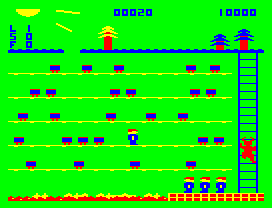
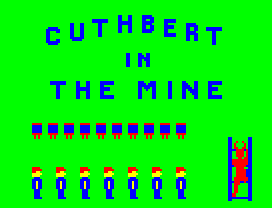
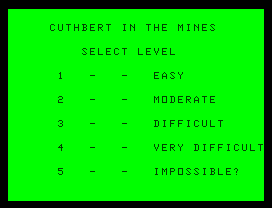
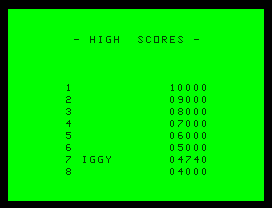
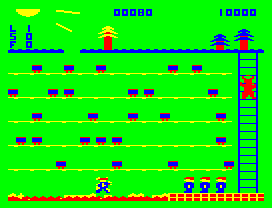



Reviews
There are no reviews yet.